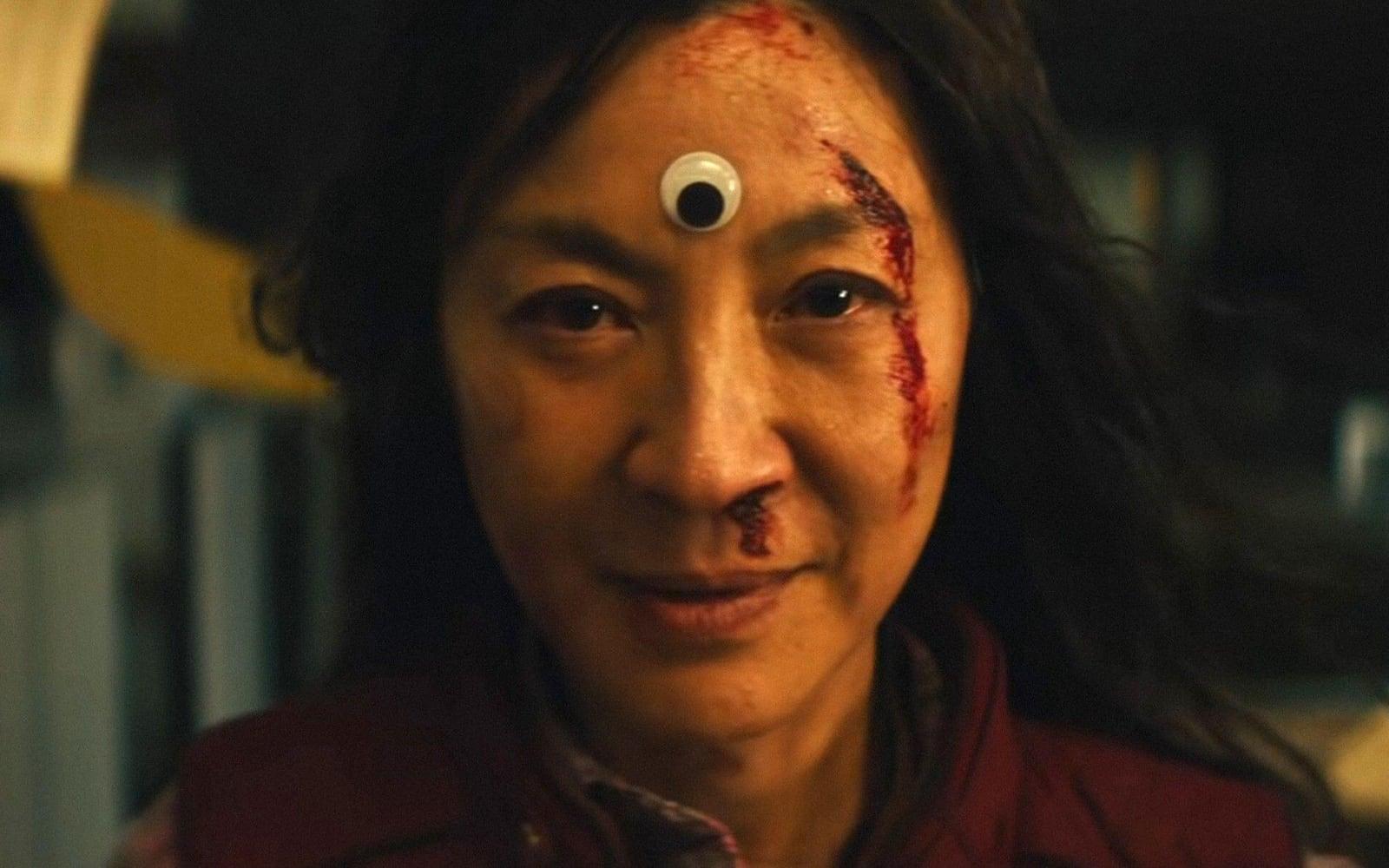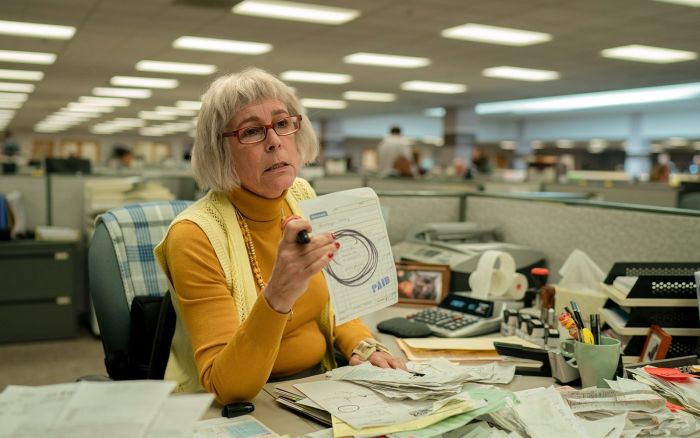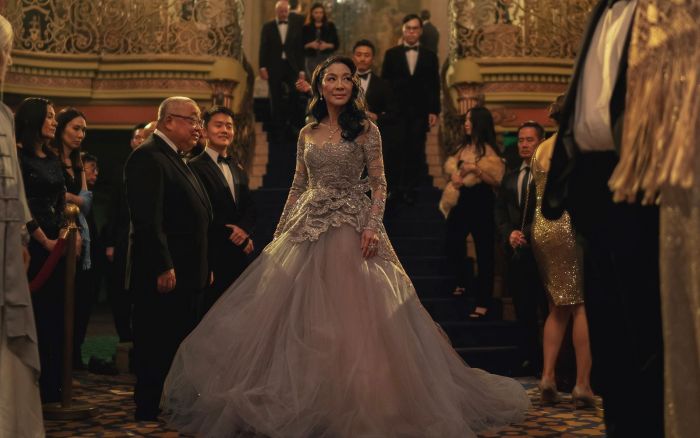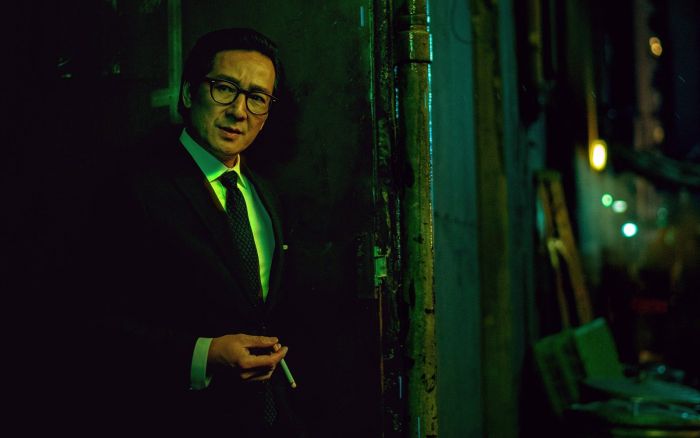Everything Everywhere All at Once by Daniels (Review)

I did my best to avoid any reviews before watching Everything Everywhere All at Once, the mind-bending multiversal trip from Daniels (the filmmaking duo of Daniel Kwan and Daniel Scheinert). I knew it would surely be a trippy film based on the trailer, but even so, I wanted to go in fresh, with as few spoilers or preconceived notions as possible.
The joy of watching Everything Everywhere All at Once comes from the experience of feeling your unprepared brain melt from the unceasing onslaught of psychedelic visuals, clever action sequences, references and homages (e.g., The Matrix, Ratatouille, 2001: A Space Odyssey, the films of Wong Kar-wai), and heady existentialism. Indeed, given everything that Daniels packs into the film’s 139 minutes, I doubt you’ll see a more accurately titled movie this year than Everything Everywhere All at Once.
Evelyn Wang (Michelle Yeoh) manages a rundown laundromat with her husband Waymond (Ke Huy Quan) and daughter Joy (Stephanie Hsu). Unfortunately, they’re in dire financial straits and scrambling to file their taxes with the aid of a contentious IRS agent named Deirdre Beaubeirdra (Jamie Lee Curtis). Further compounding tensions, Evelyn’s cantankerous father (James Hong) is visiting from China while Joy is trying to get Evelyn to accept her new girlfriend, Becky (Tallie Medel).

In the film’s opening scenes, Evelyn seems like she’s on the verge of a nervous breakdown as she frantically tries to juggle all of her many obligations and responsibilities. But her reality truly does break when she encounters a version of Waymond from a parallel universe who warns of a great evil threatening the entire multiverse. What follows is a madcap journey through dozens of universes as Evelyn catches glimpses of what her life could’ve been like had she made different life choices, like heeding her father’s wishes and not marrying Waymond.
During her journey, Evelyn gains the ability to access her doppelgängers’ various skills, which include everything from martial arts and teppanyaki cooking to enhanced foot agility (courtesy of an Evelyn doppelgänger who lives in a universe where humans evolved to have hot dog fingers — and yes, you did read that correctly). Such skills prove quite handy when the aforementioned evil force begins to hone in on Evelyn, but revelations about the evil’s origins may do more than unravel the multiverse; it could irreparably destroy her family.
So yeah, Everything Everywhere All at Once has a very fitting title. It feels like Daniels threw everything they could into the film and then hit “Purée.” Or, as the duo puts it:
Writing Everything Everywhere All at Once was a foolish prayer to a cold, indifferent universe. It was a dream about reconciling all of the contradictions, making sense of the largest questions, and imbuing meaning onto the dumbest, most profane parts of humanity. We wanted to stretch ourselves in every direction to bridge the generational gap that often crumbles into generational trauma. We scoffed at the false dichotomy of Scorsese Cinephiles vs Marvel Fanboys and instead asked “why not both?” It was an attempt to create the narrative equivalent of the Theory of Everything. A Big Data approach to myth-making. A post-genre deconstruction of traditional narrative. A maximalist’s manifesto for surviving in the noise of modern life.
All of this becomes particularly apparent in the film’s final act, during which things go completely off the rails and Evelyn finds herself confronting sheer nihilism and despair. But to Daniels’ credit, the film remains surprisingly coherent, its internal logic sound and easy to follow through all of the parallel universes and associated technobabble.

More importantly, the film becomes increasingly emotional as Evelyn’s battle against a multiversal threat not only has her fighting evil minions with kung fu and sign-twirling, but also confronting the trauma that she experienced from her demanding father, and how that trauma now manifests itself in her marriage and parenting. I got choked up more than once as Evelyn comes to terms with her own sense of failure and untapped potential, and her frayed relationships.
By jumping back and forth through seemingly countless perspectives, to the point where the viewer isn’t quite sure what’s really happening any more, the film becomes a purely emotional experience that’s made all the more so by surreal, nonsensical visuals like a chef controlled by a raccoon and kung fu battles involving dildos and butt plugs. (And did I mention the hot dog fingers already?)
Of course, none of this would work even half as well without amazing performances to keep things grounded. Put simply, Everything Everywhere All at Once is an absolute showcase for Michelle Yeoh, one of today’s true acting queens. While most probably recognize her from action films like Shang-Chi and the Legend of the Ten Rings, Crouching Tiger, Hidden Dragon, and Supercop, Yeoh stretches her acting chops as the beleaguered and confused Evelyn, and shines doing so. (The film had originally been written with Jackie Chan as the lead, which would’ve been… interesting.)

But matching Yeoh is Quan (aka, Data from The Goonies), who does a wonderful job of both selling Waymond’s various doppelgängers and explaining to a confused Evelyn (and the audience) how the multiverse works. Waymond could’ve been a cliché as the submissive husband longing for his wife’s affections, but Quan makes him so much more than that. He’s easily my favorite character in the movie.
Jamie Lee Curtis is a hoot as crotchety IRS agent Deirdre, and James Hong is, well, James Hong, which is to say, delightful. And finally, Joy could also have been a cliché as the daughter rebelling against her uptight, intolerant mom, but Hsu makes Joy’s anger believable by making it deeply sad and confused. She desperately wants her mom to see her as she really is, but when Evelyn tries to make her into something else, it has — spoiler alert — cosmic ramifications. (I hope somebody much smarter than me eventually writes an essay comparing the mother/daughter relationship in Everything Everywhere All at Once with the mother/daughter relationship in Turning Red, another film in which Chinese families must deal with inter-generational trauma manifesting as child rebellion.)
As a white male from the American midwest, I deeply appreciated Everything Everywhere All at Once for the glimpse it provides into another cultural context. Its depiction of a Chinese-American family — inspired by Daniel Kwan’s own parents — is exaggerated for comedic (and sci-fi) effect, but there’s an awful lot about it that still rings deeply true. There were several Asians at the screening I attended, and while we all laughed at the same jokes — have I mentioned that this movie is really funny? — I wouldn’t be surprised if the humor hit on a deeper level for them. If they saw something more than I could see, and so laughed a little harder. (Or shed a few more tears, depending on the scene.) But rather than make me feel excluded or awkward because I wasn’t in on the jokes, that just made me want to try and understand their perspective a little better.
Such is the beauty of representation, not because it offers up a fetishized or whitewashed version of another culture, but rather, because it captures another culture in all of its human-ness, with triumphs and failures alike on display. (By the way, if you haven’t already, I highly recommend reading Walter Chaw’s review, which delves into all of the ways the film speaks into his experiences as a Chinese-American.)

I suspect some will find Everything Everywhere All at Once hopelessly nihilistic. After all, Evelyn’s big emotional realization, which allows her to finally forgive herself and connect with her family, is that “nothing matters.” Some of this comes from Kwan’s own loss of his Christian faith and “the experience of losing God… of not having a moral center, and not having a focus of meaning, of purpose.” But here’s the rub: even if you believe as I do, that the universe isn’t random, but instead, ordered and upheld by a compassionate and sovereign deity, the fact is that life still feels pretty absurd more often than we care to admit. It feels random, out of control, and — to quote the Teacher from Ecclesiastes — full of vanity and futility. The righteous get what the wicked deserve, the wicked get what the righteous deserve, and so on ad infinitum.
When Waymond (or rather, Waymond’s doppelgänger), tries to convince Evelyn about the evil consuming the multiverse, he tells her that she already knows the truth: she can feel that something is deeply, truly wrong about, well, everything. It’s a sentiment that’s surely recognizable by all, especially following a years-long pandemic. In light of that, sometimes it seems that all we can do is be fiercely kind like Waymond and, like Evelyn, forgive those who’ve wronged us while seeking forgiveness from those we’ve wronged — regardless of our religious beliefs (or lack thereof).
As you can probably see, Everything Everywhere All at Once inspires a lot of thoughts because it juggles a lot of things: sci-fi comedy, existential melodrama, immigrant struggles, family dysfunctions. It’s maximalist cinema par excellence, a perfect example of an “everything and the kitchen sink” approach to filmmaking made by a very passionate, creative, and unconventional crew. It’s ambitious and bizarre, raunchy and deeply moving, nonsensical and thought-provoking — and totally unlike anything else you’re likely to see all year long.
